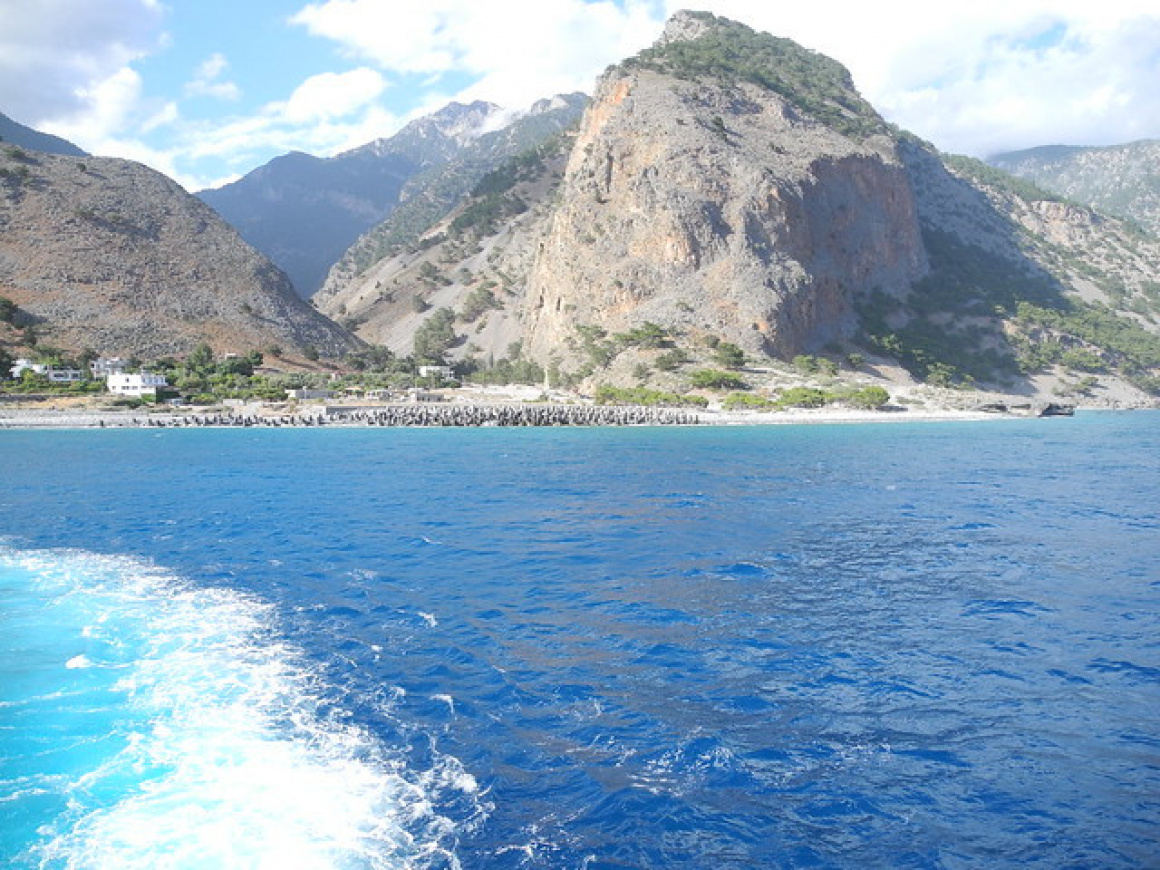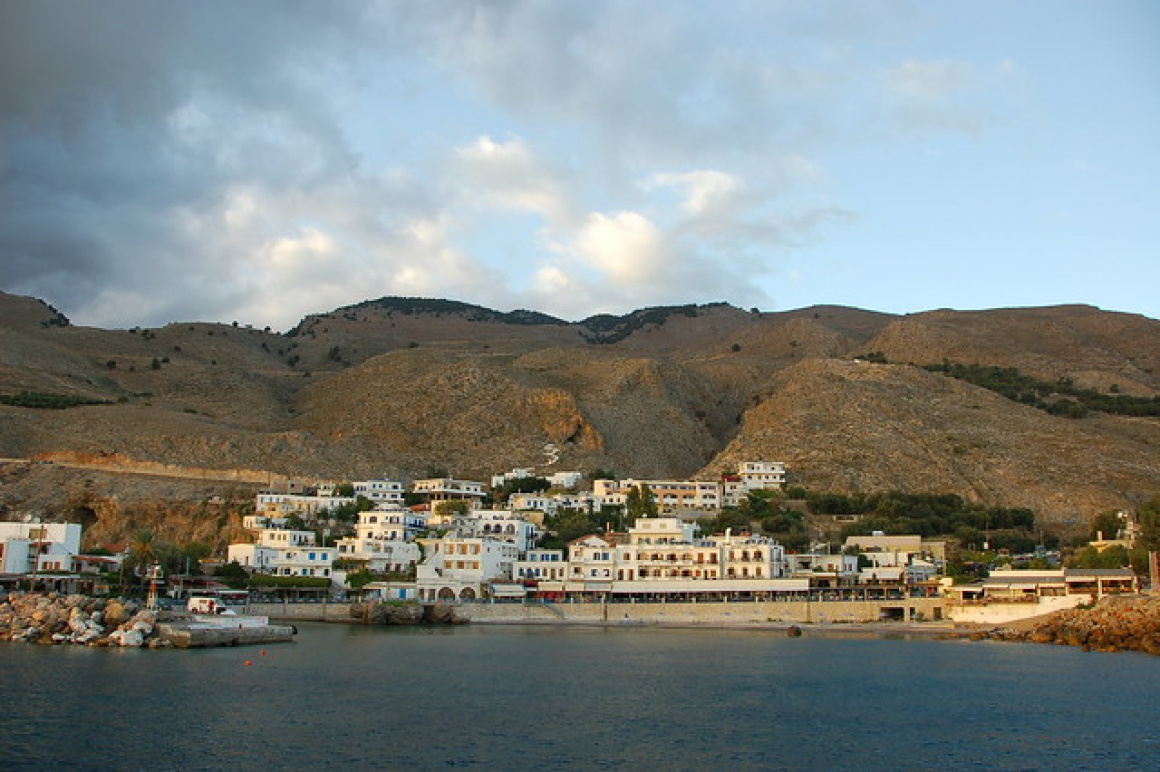Agia Roumeli, a tiny whitewashed village on Crete, lies at the dramatic mouth of the Samaria Gorge. Viewed from the Libyan Sea, it offers a captivating blend of towering mountains and serene coastal beauty.
Setting & First Impressions
Agia Roumeli is a remote seaside village dramatically positioned at the mouth of the Samaria Gorge, where sheer cliffs meet the Libyan Sea. There are no roads here, you either hike 16 km through the gorge to reach it, or arrive by boat, as Agia Roumeli is accessible only via ferry or foot. This isolation gives the village a unique, tucked-away feel. In summer afternoons, it bustles briefly with triumphant hikers emerging from Samaria's end, cooling their feet in the sea. By evening, once the last ferry departs, Agia Roumeli reverts to tranquillity, just a few hundred residents and intrepid overnighters, surrounded by silence broken only by cicadas and the gentle surf.

 'Leaving Agia Roumeli' - Attribution: Shepard4711
'Leaving Agia Roumeli' - Attribution: Shepard4711Personal Anecdote
I decided to overnight in Agia Roumeli after my Samaria trek (rather than ferrying out same-day). At dusk, I sat on the pebble beach with a cold drink, watching the sun dip behind the gorge's silhouette. The day-trippers were gone, it was just me, a couple of locals fishing, and pink-orange light reflecting off the cliffs. It felt like having a secret bit of Crete all to myself.
Samaria Gorge Experience
Agia Roumeli exists largely because of the Samaria Gorge, Europe's longest gorge and Crete's most famous hike. Most hikers start at the top (Xyloskalo in Omalos) and finish here, a 5-7 hour descent through ancient forests, a ghost village, and the narrow “Iron Gates” strait (just 4m wide), an epic journey ending at the Libyan Sea. Reaching Agia Roumeli, hikers often bee-line for the first taverna or straight into the sea for a rejuvenating swim! If you're doing the gorge, consider staying the night, the village has simple guesthouses and it means you can shower, relax, and catch a quieter morning ferry next day instead of the crowded one. Plus, you can then explore Agia Roumeli's own charms.

 '170209-N-AF077-049' - Attribution: CNE CNA C6F
'170209-N-AF077-049' - Attribution: CNE CNA C6FAncient Tarra & Local Sights
Long before tourism, Agia Roumeli's spot was home to Tarra, an ancient city-state renowned for a Temple of Apollo. Though Tarra was largely destroyed by a 365 AD earthquake, you can find vestiges, behind the village's modern church, look for ruins of the Apollo temple, column bases and paving, later repurposed into an early Christian basilica. There's even a set of chunky mosaic floor fragments if you look carefully. A small sign marks the site, but otherwise it's surprisingly low-key for such history. Just imagine weary pagan pilgrims emerging from the gorge 2,000 years ago to worship Apollo Tarraios here!
On the east side of the riverbed (which is the gorge's exit), you'll see remnants of an Ottoman-Venetian fortress (Koules) perched on a hill. It's about a 30-45 minute steep hike up but worth the view. The fort (Agia Roumeli Koule) was built by the Turks in the 19th century to control the gorge and watch over the coast. Though now ruined, climbing among its crumbling walls gives a fantastic panorama of the village, beach, and boundless sea. Go in the morning before it's too hot. I went at 8am and had breakfast (a cheese pie I carried up) with the entire Libyan Sea glittering in solitude below. There's also a “Small Koule” further up the mountain (ruins of a second fort), but that hike is more challenging and for history buffs or adventure-seekers only.
Beach & Relaxation
Agia Roumeli's beach stretches in two directions, with fine dark pebbles and some sandy patches. It's remarkably clean and wonderfully uncrowded outside of 11am-4pm when gorge hikers trickle through. Swim out a bit and look back, you'll see the immense gorge cleaving the mountains, a view only swimmers get! Toward the western end by the pier, the beach is organised with umbrellas. Eastward, it's all natural. The water here is deliciously refreshing (slightly cooler due to freshwater mixing from the gorge's river). After my hike, that first dunk in the Libyan Sea felt like pure heaven, washing off sweat and soreness.

 'This is a panorama of Agia Roumeli in Crete created by stitching 5 photographs. Photo by alefbetac. See https://www.Flickr.com/photos/alefbetac/ for more photos by me.' - Attribution: Alefbetac at English Wikipedia
'This is a panorama of Agia Roumeli in Crete created by stitching 5 photographs. Photo by alefbetac. See https://www.Flickr.com/photos/alefbetac/ for more photos by me.' - Attribution: Alefbetac at English WikipediaOne delight of overnighting is the night swim potential, the sea often stays calm at dusk, and I floated on my back watching stars appear one by one in an inky sky with zero light pollution. Next day, consider renting a kayak, a couple of places rent them by the hour, to paddle to Agios Pavlos Beach (3km east, location of a tiny 10th-century chapel on the sand) or even further to Domata Beach (accessible only by sea or multi-day hike, with surreal rock formations). Kayaking along this coastline, you might spot monk seals or falcons, it's part of a protected area.
Village Vibes & Food
Agia Roumeli's charm is in its simplicity. There's one mini-market, a few souvenir stalls (yes, you can buy the “I Survived Samaria Gorge” T-shirt if inclined!), and a handful of tavernas mostly lining the beachfront or one street back. Despite being the end of a tourist trail, the food is surprisingly authentic and very affordably priced, the competition isn't fierce, but pride in local cuisine is strong.
For a hearty meal, Tarra Taverna (aptly named after the ancient city) serves an excellent lamb antikristo (slow-roasted over coals, a Sfakian speciality). Calypso is a popular guesthouse and restaurant, I loved their stuffed tomatoes and boureki (cheese, potato & courgette bake). Sweet Corner Café is famous for treats, the owner, a former beekeeper, makes divine sfakiani pita with honey and fresh yoghurt with homemade preserves. It's also a bakery, so grab some sesame-crusted bread rings or spinach pies in the morning before your ferry.
Accommodation
Options are modest but perfectly decent, mostly family-run guesthouses. Agia Roumeli Hotel is right by the gorge exit and beach, convenient and hospitable, with simple rooms and balconies. Faragi (which means “gorge”) Hotel is another good one, newer, with very clean rooms and an on-site taverna that bakes fresh bread daily. Artemis Studios offers kitchenette units, good if you want to self-cater or stay a few days to really unplug. One place I found memorable is Gigilos (named after a local peak), offering simple rooms with the soothing sound of the nearby river, located right on the beach with free sunbeds for guests. July and August see some visitors staying, but rarely is anywhere fully booked, still, if you arrive after the long hike with no reservation, just be ready to ask around a bit (everyone will help point you to vacancies). Many travellers simply don't realise they can stay, so there's an informal availability.
Activities beyond Hiking
While Samaria is the star, if you stay you can enjoy other pursuits. Stargazing is phenomenal, with the gorge at your back, you can almost feel the mountains shielding you from the rest of the world. On certain clear nights, you see the Milky Way stripe vividly overhead. Bring a travel tripod and you can get great astrophotography shots with the silhouetted gorge. Fishing trips can be arranged by locals (in the evening or pre-dawn), a unique chance to catch your own dinner (common catches, red mullet or small groupers). They'll often cook it for you at the taverna after!
Connectivity & Practicalities
Keep in mind, no roads means no cars, a blessing in disguise. Wear comfortable shoes even in the village because it's pebbly terrain. There's a public telephone booth (remnant of pre-cellular days) that's now mostly a quirky landmark. Cell signal might be weak until the ferries leave (when hundreds of phones aren't jamming the small tower). Electricity and hot water are reliable though, and several tavernas offer WiFi. Ferry schedules, in high season, morning ferry comes from Sfakia and late afternoon ferries go to Sfakia or Sougia/Paleochora, coordinate your Samaria hike timing or you'll be staying (which, as I argue, isn't a bad thing!). Also note, if winds are very strong (occasionally in September), ferries can be cancelled, another reason to occasionally plan an overnight, so you're not in a pinch.
Why Stay?
Agia Roumeli by day and by night are two different worlds. Day, a rewarding finish line with cold beers and celebratory swims. Night, a peaceful retreat where the stars and sea take centre stage. Many travellers hurry off, but those who linger discover the rhythm of a village that has seen civilisations come and go yet remains anchored by nature's grandeur. I remember my second morning, waking up early due to a rooster crow, and taking a stroll while the rising sun painted the gorge walls orange. An old man was tending to his goats by the riverbed, he waved and said “kalimera.” The simplicity was profound.
Agia Roumeli teaches that beyond every journey's end is a new quiet beginning, if you slow down to appreciate it. It's not just a gateway out of Samaria, it's a destination in itself, offering solitude, history, and raw beauty to those willing to pause and listen to the whisper of the gorge and the lullaby of the Libyan Sea.
To find your dream hotels in Agia Roumeli and around the world, we’ve created Travelmyth, the unique hotel search engine with the widest selection of category filters. Whether you’re looking for luxury hotels in Canary Islands or hotels with pool water slide in Myrtle Beach, Travelmyth makes it easy for you to find the best hotels that match your needs and preferences.

